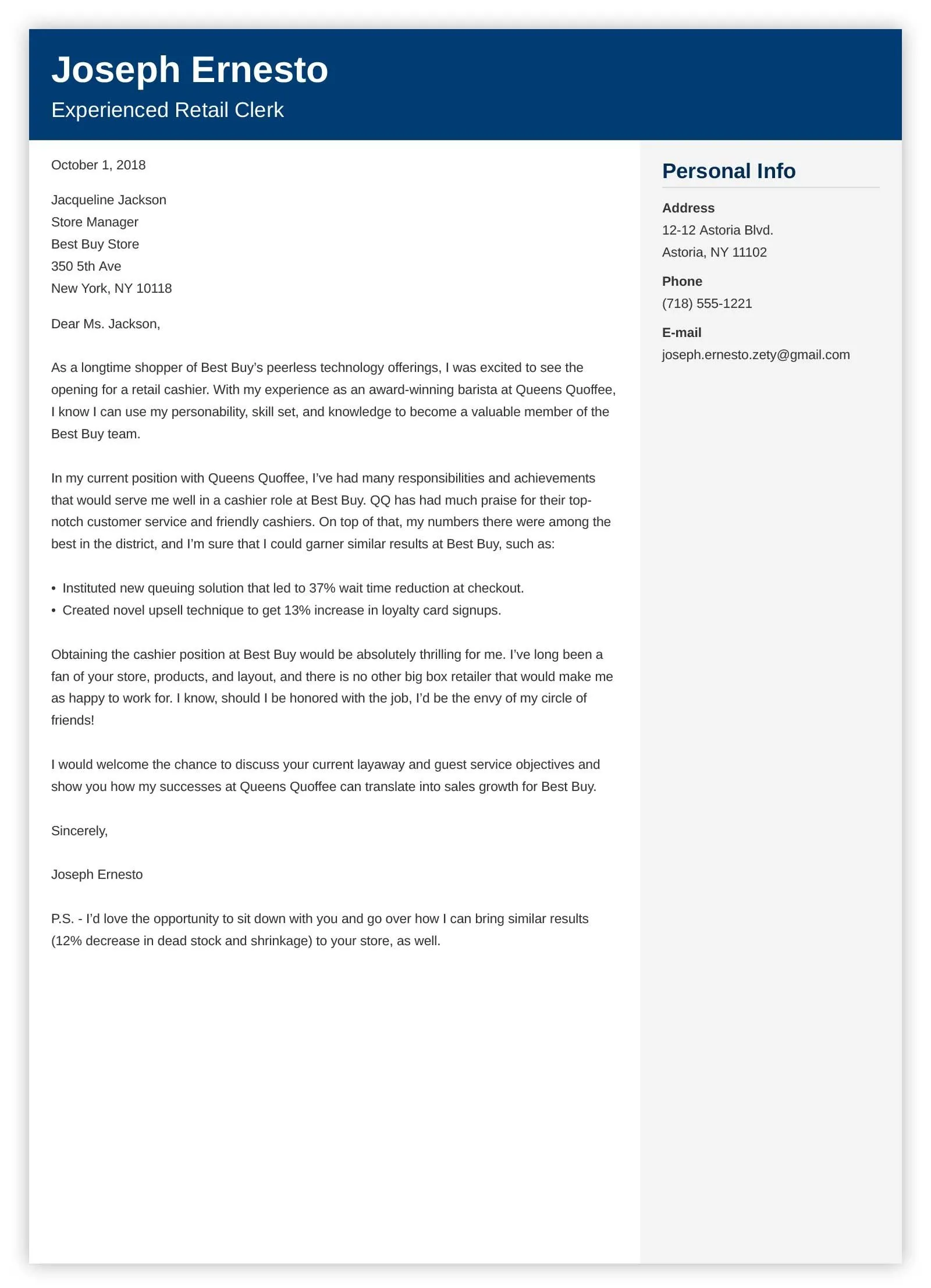Why a Strong Retail Cover Letter Matters
In the competitive world of retail, a compelling cover letter is your first opportunity to make a lasting impression. It’s more than just a formality; it’s a crucial tool to showcase your personality, skills, and enthusiasm for the role. A well-crafted cover letter acts as a personal introduction, allowing you to highlight your relevant experience and explain why you’re the perfect fit for the position. This is your chance to go beyond the resume and tell the hiring manager a story – a story of your retail career, your passion for customer service, and your commitment to achieving sales targets. It sets the tone and provides context, making your application stand out from the crowd. Remember, in the fast-paced retail environment, first impressions are everything, and your cover letter is your chance to make yours count. Therefore, it is essential to craft a cover letter that captures the attention of the hiring manager and makes them want to learn more about you and your experience in the world of retail.
Showcasing Your Retail Skills and Experience
Your retail cover letter is your platform to exhibit your skills and experiences in a way that is both engaging and relevant. Begin by clearly stating the specific retail role you’re applying for and the company you’re targeting. Then, focus on highlighting the skills that align with the job description. Think about what makes you stand out from other applicants. Do you have a knack for visual merchandising? Are you skilled in handling customer complaints and resolving issues efficiently? Consider using action verbs to describe your accomplishments. For example, instead of saying ‘I was responsible for sales,’ try ‘I consistently exceeded sales targets by 15%’. Always provide quantifiable results when possible; this will help the hiring manager see the value you can bring to the team. Moreover, tailoring your skills and experience to match the specific requirements of the retail job demonstrates your genuine interest and attention to detail, both of which are highly valued in the retail industry.
Highlighting Relevant Retail Experience
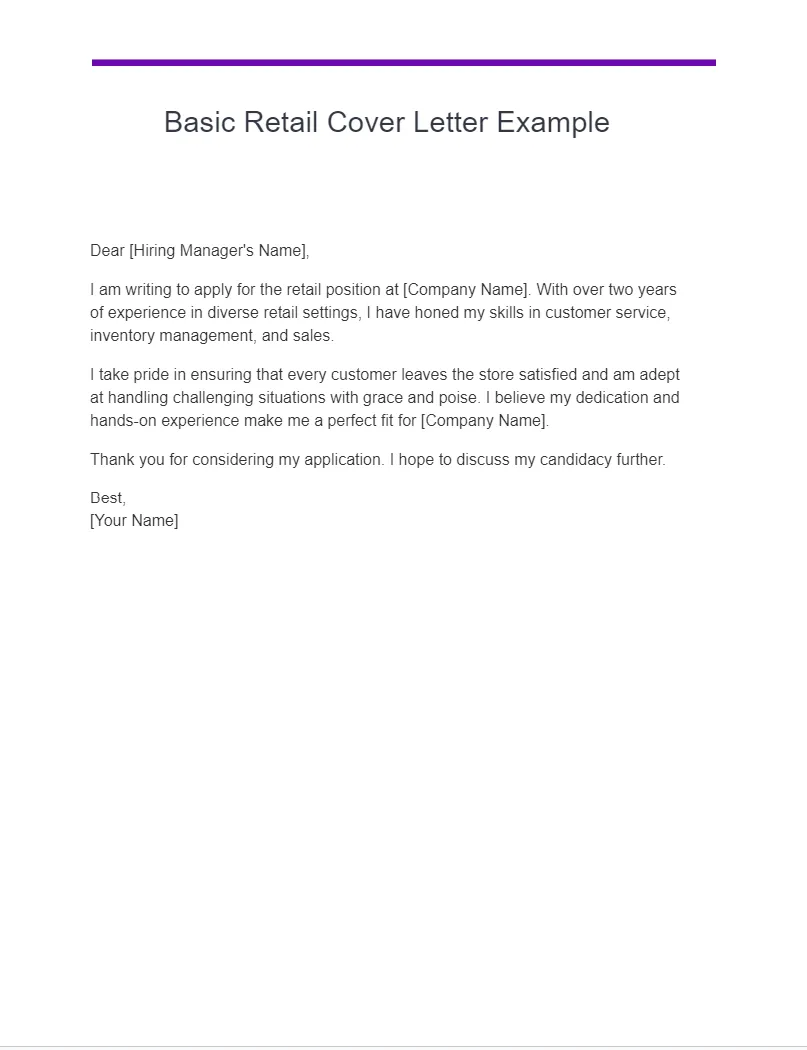
Your retail experience is the foundation of your cover letter, so it is important to showcase it effectively. Mention any previous retail roles you’ve held, including the company name, your job title, and the duration of your employment. Even if your past experiences are not directly related to the role you’re applying for, you can draw parallels to demonstrate transferable skills. For example, if you’ve worked in a fast-food restaurant, you can highlight your ability to work under pressure and handle multiple tasks simultaneously, which are crucial in a retail environment. Focus on the tasks and responsibilities that align with the job requirements. Be specific about your accomplishments, detailing any instances where you went above and beyond to meet sales goals, improve customer satisfaction, or streamline processes. Use strong action verbs to begin your bullet points or descriptions, illustrating the actions you took and the positive outcomes that resulted from those actions. This ensures that your experiences are not just listed but are instead presented as evidence of your skills and capabilities.
Detailing Customer Service Expertise
Customer service is at the heart of any successful retail operation, and highlighting your expertise in this area is vital in your cover letter. Provide specific examples of how you’ve handled customer interactions, addressing complaints, and building relationships. If you’ve received positive feedback from customers or been recognized for exceptional service, make sure to include it. Describe your approach to resolving customer issues. Do you follow a specific method, such as active listening, empathy, or finding creative solutions? Showcase your ability to create a positive customer experience. Mention any training or certifications you have received in customer service, like courses in conflict resolution or communication skills. Retailers want to hire individuals who not only meet customer needs but also exceed expectations. If you have experience using customer relationship management (CRM) systems or other tools to improve customer satisfaction, include these details. Remember, demonstrating a genuine commitment to customer satisfaction can set you apart in the application process.
Demonstrating Sales and Upselling Abilities
Retailers are primarily focused on sales, so highlighting your skills in this area is crucial for your application. Detail your sales experience, including any sales targets you’ve met or exceeded. Use quantifiable metrics to showcase your achievements, such as a percentage increase in sales or the number of transactions you handled. Describe your approach to sales, whether it involves building rapport with customers, understanding their needs, or recommending relevant products. Mention any upselling or cross-selling techniques you’ve used to increase revenue. Demonstrate your ability to close sales and handle objections from customers. If you have experience working with sales promotions or incentive programs, be sure to describe these experiences. Show the hiring manager that you not only understand the importance of sales, but also have the ability to drive them. When presenting your sales skills, focus on showing how you have contributed to the success of your previous employers.
Quantifying Your Achievements in Retail
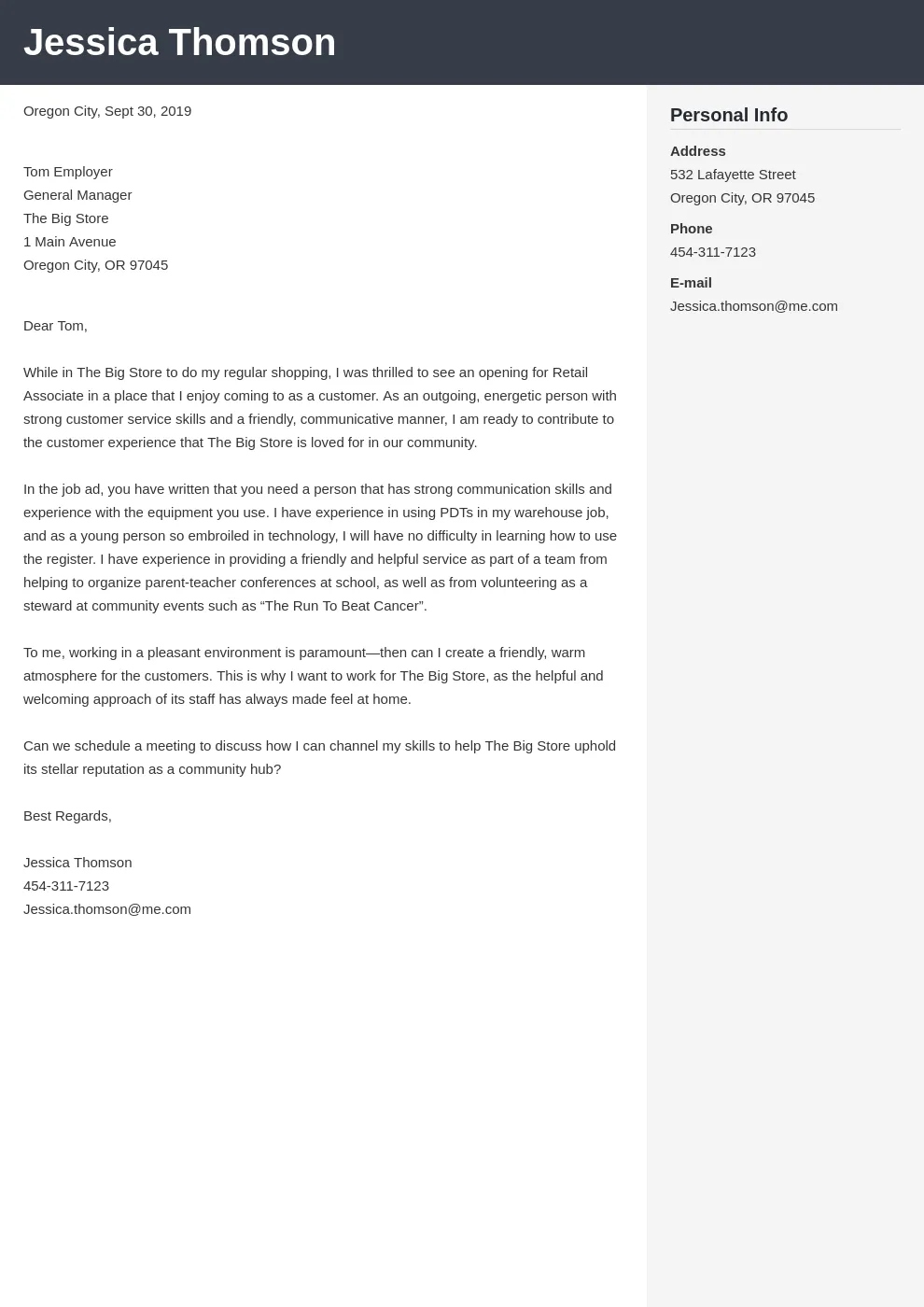
Quantifying your achievements is an effective way to demonstrate the value you can bring to a retail role. Rather than making general statements, provide specific numbers and percentages that back up your claims. For example, instead of saying ‘I increased sales,’ you could say ‘I increased sales by 20% within six months by implementing a new customer engagement strategy.’ Quantifiable achievements provide tangible evidence of your skills and capabilities. Include metrics such as the number of customers you assisted, the average transaction value you achieved, or the amount of inventory you managed. If you’ve received any awards or recognition for your performance, be sure to mention these as well. Quantifying your achievements allows the hiring manager to understand your impact and helps them make informed decisions about the potential value you could bring to the company.
Formatting Your Retail Cover Letter for Success
The formatting of your retail cover letter plays a vital role in creating a positive first impression. Start with a professional header that includes your contact information: name, phone number, email address, and possibly a link to your LinkedIn profile. Address the hiring manager by name, if possible. Research the company to find the name of the hiring manager. Use a clear, easy-to-read font, such as Arial or Times New Roman, in a standard size (11 or 12 points). Maintain consistent formatting throughout the letter. Use concise paragraphs, and use bullet points where applicable to break up large blocks of text. Keep your cover letter to one page in length. Ensure your cover letter has a proper structure, with an introduction, body paragraphs highlighting your skills and experience, and a closing paragraph that expresses your interest in the role and thanks the reader for their time. A well-formatted cover letter shows attention to detail, which is a valued trait in retail.
Using a Professional Tone and Language
The tone and language you use in your retail cover letter should be professional and reflect your ability to communicate effectively. Use a formal tone and avoid slang or colloquialisms. Proofread your letter carefully to avoid any grammatical errors or typos. Use clear and concise language that gets straight to the point. Highlight your communication skills, and use positive, enthusiastic language to express your interest in the role and the company. Maintain a respectful and courteous tone throughout. Ensure that the language used aligns with the retail brand and target audience. You want to show your ability to communicate effectively with customers, colleagues, and supervisors. This reflects your professionalism and ability to present yourself effectively in the workplace.
Customizing Your Cover Letter for Each Retail Job
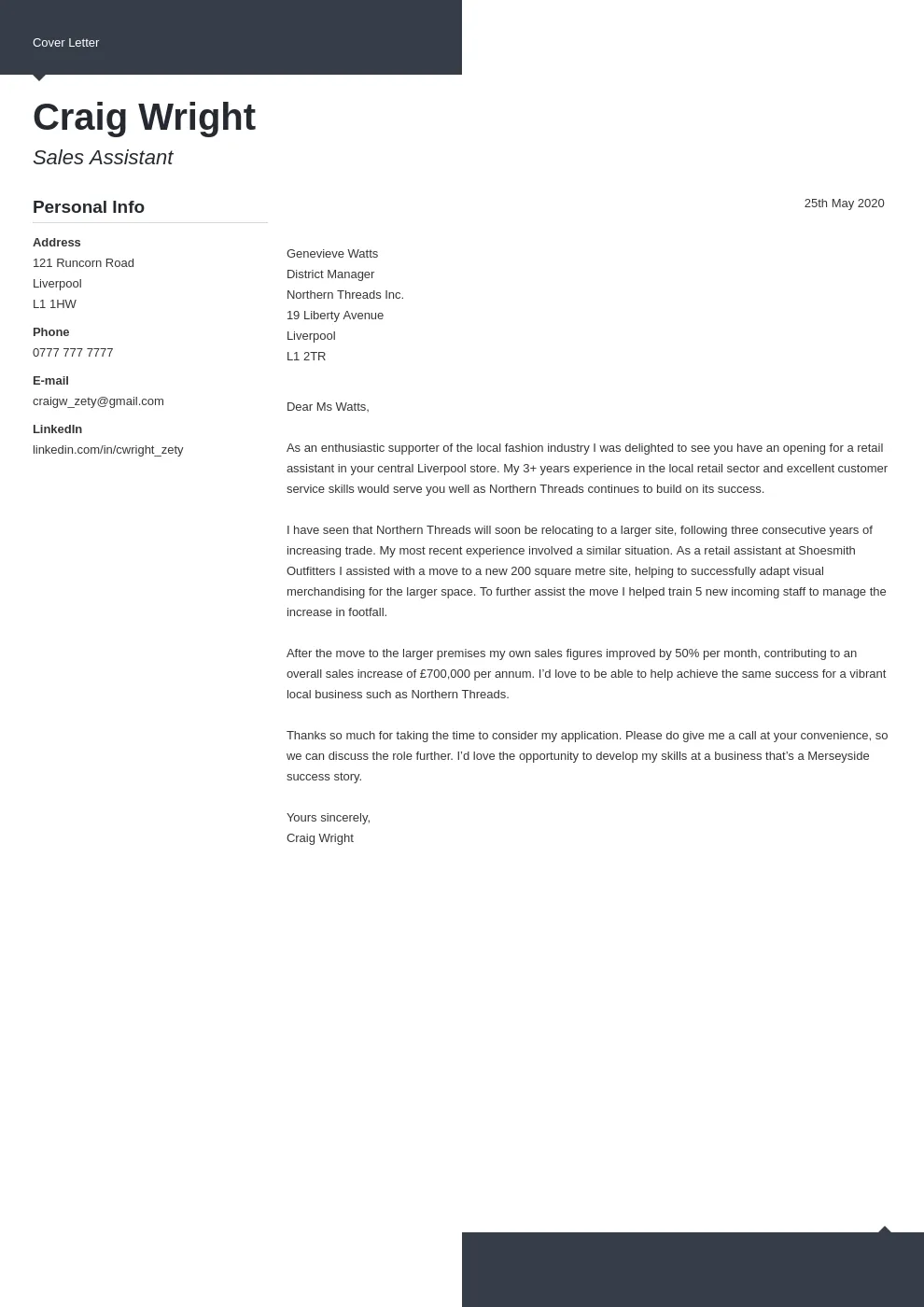
Customization is essential to make your cover letter stand out. Generic cover letters often lack impact. Tailor your cover letter to the specific requirements of each retail job. Before you start writing, carefully read the job description and identify the key skills and qualifications the employer is seeking. Incorporate these keywords and phrases into your cover letter. Highlight the specific retail experiences that align with the job requirements and demonstrate how you possess those qualities. Mention the name of the retail company and show that you’ve researched the company’s values, products, and services. By tailoring your cover letter, you demonstrate your genuine interest in the role and your understanding of the company’s needs. Customization is a key factor in showcasing why you are the best fit for the particular retail position and helps you avoid being perceived as a generic applicant.
Tailoring to the Specific Retail Role
In the retail sector, the job roles vary significantly. Whether you’re applying for a sales associate position, a store manager role, or a customer service representative, tailoring your cover letter to the specific role is key. When applying for a sales associate position, emphasize your customer service and sales abilities, highlighting your experience in assisting customers, processing transactions, and exceeding sales targets. If you’re applying for a store manager role, showcase your leadership and management skills, highlighting your experience in staff training, inventory management, and store operations. If you’re applying for a customer service representative role, focus on your skills in handling customer complaints, resolving issues, and creating a positive customer experience. Show the hiring manager that you understand the specific responsibilities of the role and that you have the skills and experience to excel in it. This customization shows your attention to detail and your genuine interest in the role.
Mentioning the Retail Company’s Values
Show that you are a good fit by mentioning the retail company’s values. Before writing your cover letter, research the company’s values, mission, and culture. You can usually find this information on their website or social media pages. Mention how your values align with the company’s values, and provide examples of how you have demonstrated these values in your previous roles. For instance, if the company emphasizes customer service, highlight your commitment to providing excellent customer experiences. If the company is focused on innovation, talk about your experience with implementing new sales strategies. Demonstrate that you are not just looking for a job, but that you share the company’s vision and are excited to contribute to its success. This shows the hiring manager that you are a good cultural fit and that you are genuinely interested in working for their company, which significantly increases your chances of getting an interview.
Proofreading and Polishing Your Cover Letter
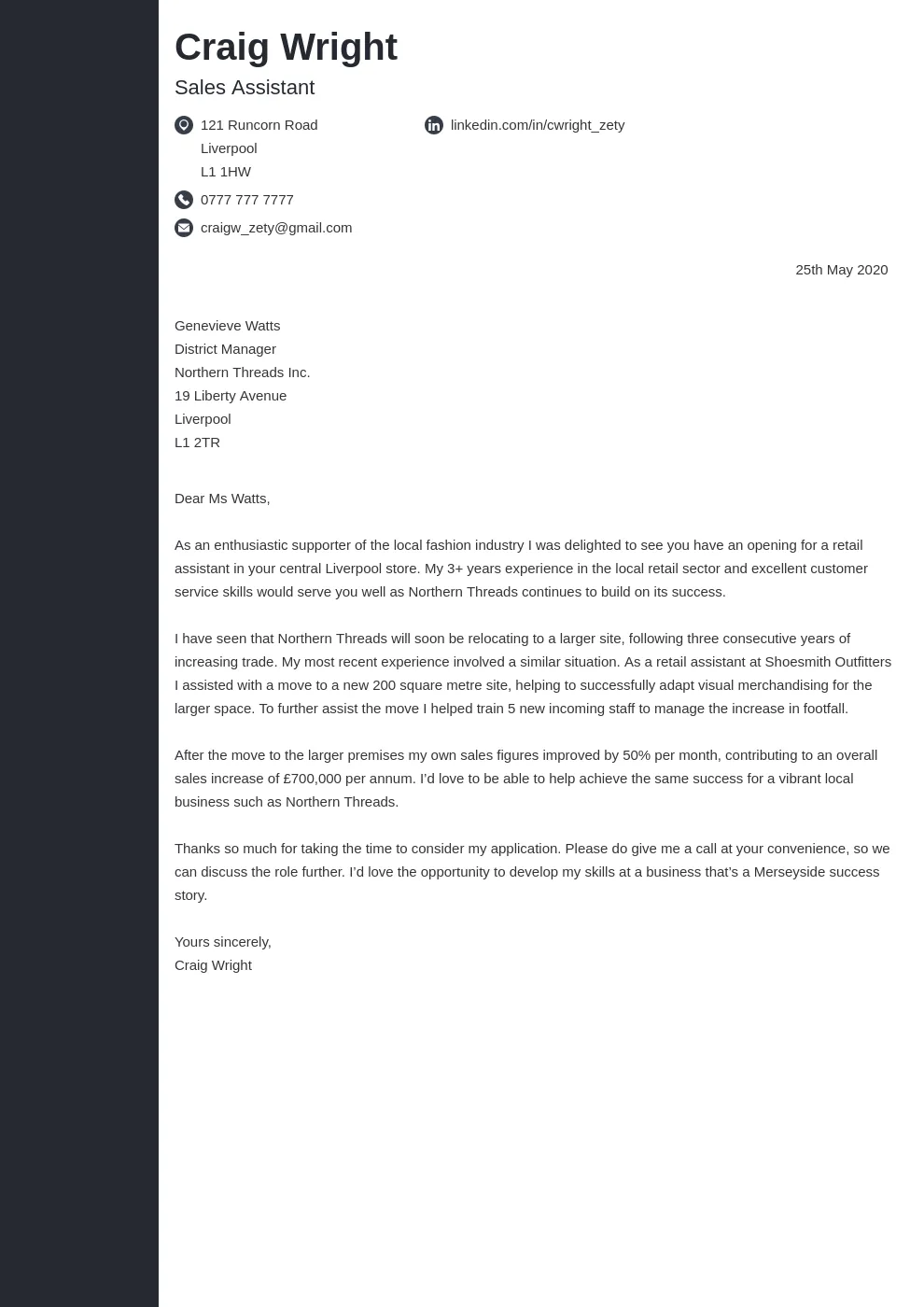
Before submitting your cover letter, proofread it carefully for any errors. Typos, grammatical errors, and formatting inconsistencies can detract from your application. Check your cover letter multiple times, and consider having a friend, family member, or career counselor review it. Read your cover letter aloud to help catch any awkward phrasing or unclear sentences. Ensure the content is well-organized, with each paragraph focused on a specific topic. Check for consistency in fonts, formatting, and style. Proofreading and polishing your cover letter shows your attention to detail, your respect for the employer, and your commitment to producing high-quality work. A polished cover letter demonstrates your professionalism and increases your chances of getting noticed by the hiring manager. Take the time to perfect your cover letter before submitting your application to maximize your chances of getting a retail job.
Common Retail Cover Letter Mistakes to Avoid
Avoid common mistakes that can hinder your chances of getting hired. Understanding these pitfalls can prevent you from making critical errors that undermine your application. These mistakes can range from failing to tailor your letter to using generic language or making careless errors. Careful attention to detail and thorough proofreading will make your cover letter stand out for the right reasons. Being aware of these common mistakes will enable you to construct a cover letter that highlights your qualifications and increases your chances of securing an interview.
Lack of Tailoring
A lack of tailoring is a common mistake. Avoid sending a generic cover letter to every retail job you apply for. Generic cover letters don’t demonstrate a genuine interest in the company or the specific role. Always customize your cover letter to the specific requirements of each job. Carefully read the job description and highlight the skills and experiences that match the employer’s needs. Mention the company’s name, values, and products to show you’ve done your research. A tailored cover letter shows the hiring manager that you have invested time and effort in your application. Customize your cover letter for each retail job to enhance your chances of getting an interview.
Generic Language
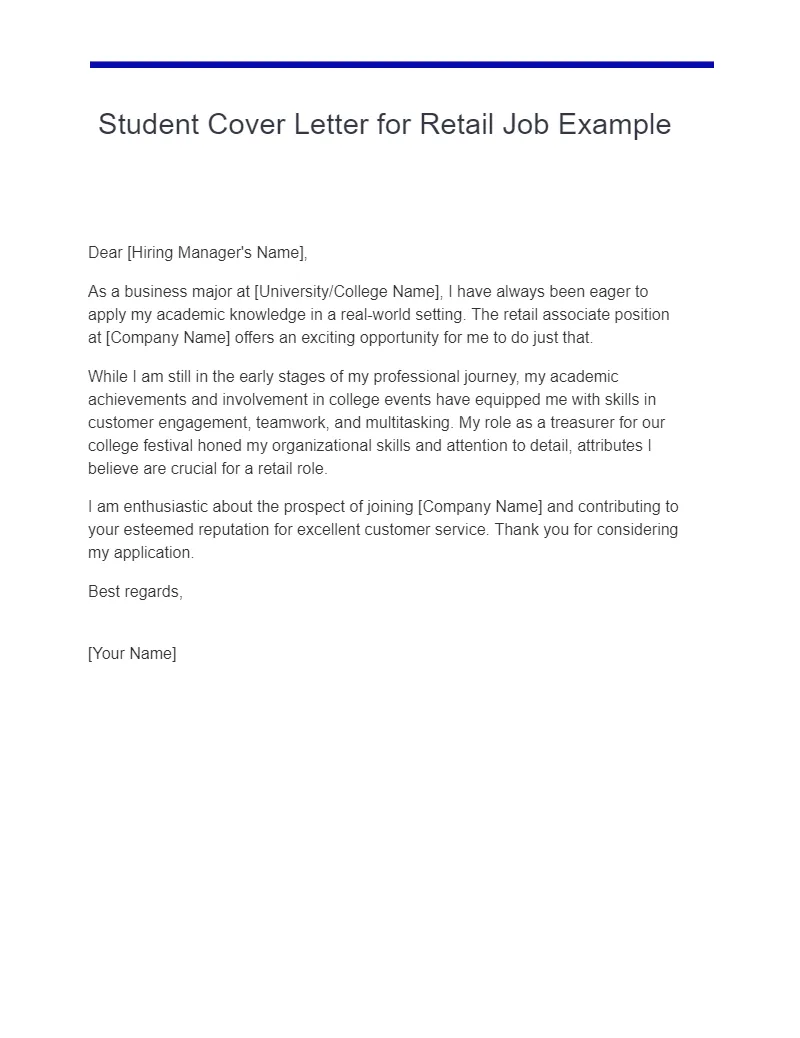
Avoid using generic language that fails to convey your unique skills and experience. Generic phrases like ‘hardworking’ and ’team player’ don’t provide specific details about your abilities. Instead, use specific examples to demonstrate your skills. Quantify your achievements whenever possible to provide tangible evidence of your accomplishments. Use action verbs to describe your skills and accomplishments. By avoiding generic language, you can present a more compelling picture of your retail expertise, which increases the likelihood of getting an interview.
Typos and Grammatical Errors
Typos and grammatical errors can undermine your credibility. Proofread your cover letter multiple times to catch any errors. Even a minor typo can make your application appear unprofessional. Consider using a grammar checker to identify and correct errors. Ask a friend or family member to review your cover letter for mistakes. A clean, error-free cover letter shows your attention to detail and your commitment to quality, while a cover letter containing typos and errors reflects poorly on your professionalism. Before submitting your application, be sure to take the time to carefully proofread your cover letter, to ensure it makes a positive first impression.
Review of Retail Cover Letter Examples
Reviewing retail cover letter examples can provide valuable insights into the elements that make a cover letter effective. Analyze successful examples to understand how to showcase your skills, experiences, and accomplishments. Use these examples as a guide to structure and format your cover letter. Adapt the examples to fit your experience and the job you are applying for. Pay attention to the language used, the tone, and the overall presentation. Reviewing and learning from examples helps you create a cover letter that stands out from the crowd.
Example 1 Sales Associate
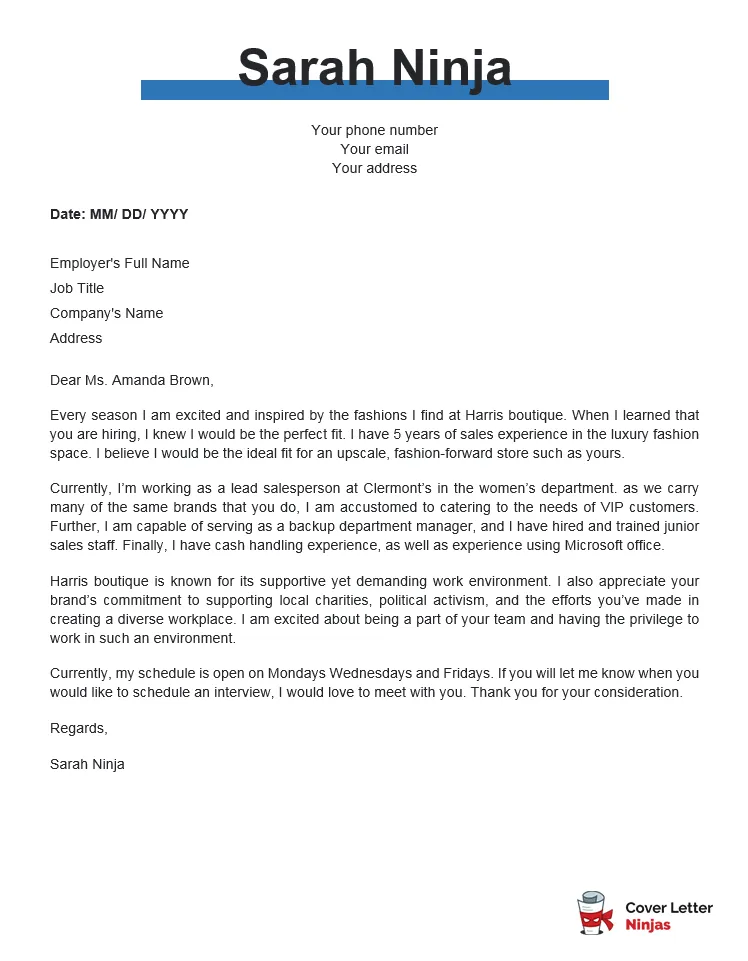
This example should highlight the skills required for a sales associate position, such as customer service and sales experience. The candidate could showcase their experience in assisting customers, processing transactions, and exceeding sales targets. Include examples of how they have provided exceptional customer service, handled customer inquiries, and resolved customer issues. Describe how they contributed to the sales goals of the company, including the use of specific sales techniques, such as upselling, cross-selling, and building rapport with customers. This example provides a clear idea of how to present your skills, including customer service and sales, for the sales associate position.
Example 2 Store Manager
For the store manager position, emphasize leadership, management, and operational skills. The candidate could showcase their experience in staff training, inventory management, and store operations. Provide details about the strategies they employed to improve store performance and drive sales, including examples of how they successfully managed store operations. This example provides a clear idea of how to present your leadership, management, and operational skills.
Example 3 Customer Service Representative
This example should focus on customer service and communication skills. The candidate could highlight their experience in resolving customer complaints, addressing customer inquiries, and creating a positive customer experience. This example is a great way to showcase the customer service skills and provide insight on how to apply for a retail customer service representative position. This example is great for presenting your customer service skills and providing insights on the role you play.
